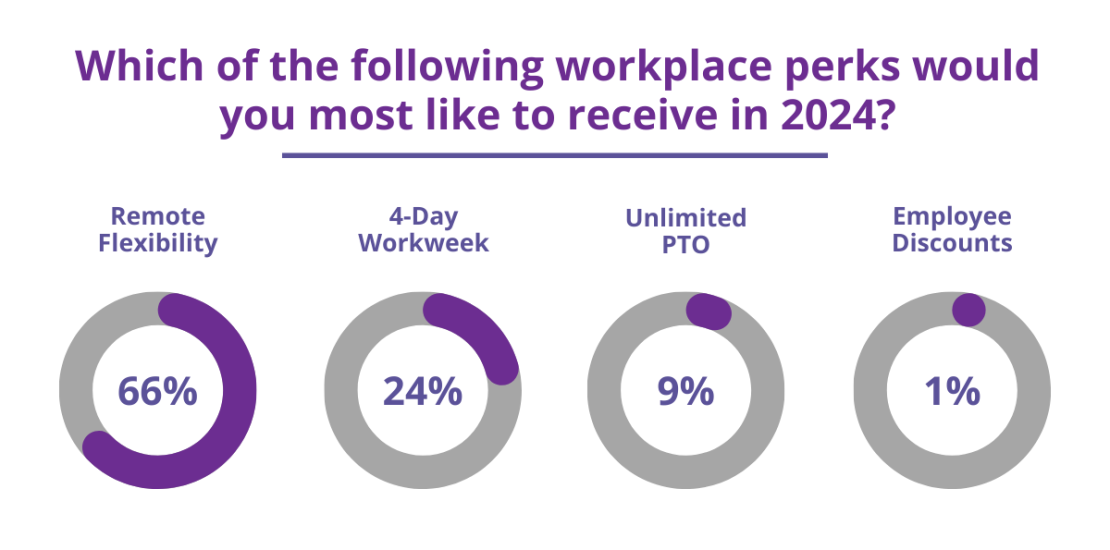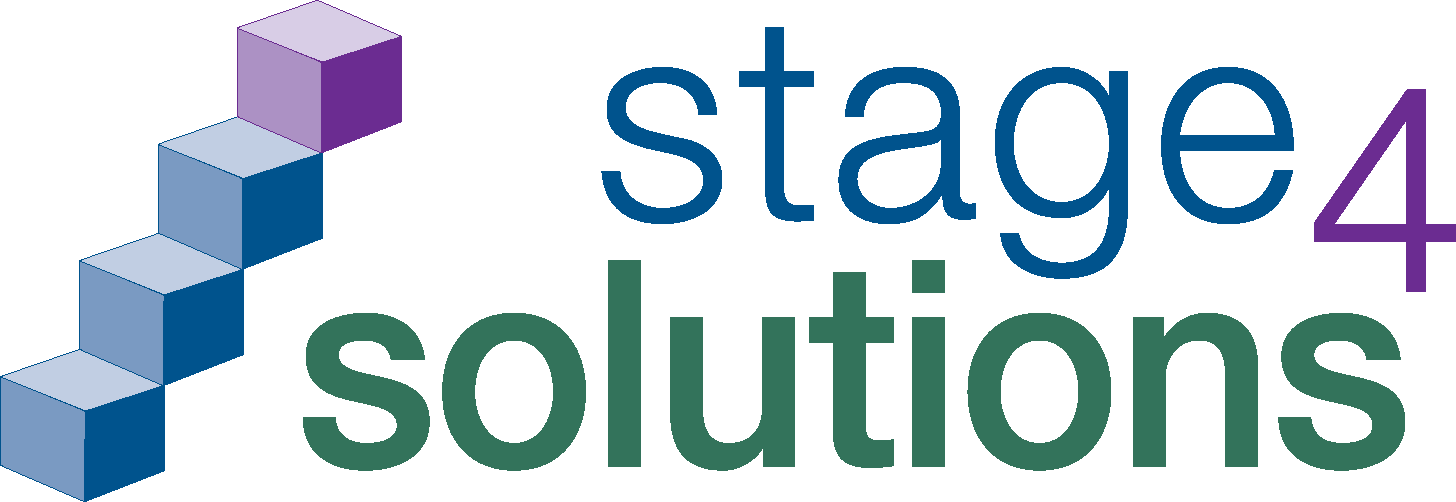Employee View Poll: Top Workplace Considerations in 2024
- January 22, 2024
- Posted by: Stage 4 Solutions
- Category: Blog

In recent years with the global pandemic, shifting demographics, and technological advancements, the priorities of employees within the workforce have undergone a profound transformation. Today’s professionals, regardless of generational differences, are driven by a desire for well-being, and a sense of purpose, and are increasingly seeking more than just a traditional job. Organizations must recognize these changing priorities to attract and retain top talent.
An appealing compensation package continues to be a key factor in attracting top talent and reducing employee turnover, however, other factors are equally impactful. We wanted to understand the top workplace perks employees would most like to receive in 2024 and polled our community for their insights.
Which of the following workplace perks would you most like to receive in 2024? (single answer)
- Remote flexibility – 66%
- 4-day workweek – 24%
- Unlimited PTO – 9%
- Employee discounts – 1%
The majority, 66% of respondents, chose remote flexibility as the most desired perk. Despite the heightened prevalence of remote work during and after the pandemic, there appears to be a shift away from this trend, contradicting the preferences expressed by employees. According to WFH Research, conducted by Stanford University and the University of Chicago, 59% of full-time employees have returned to a 100% on-site work model, 29% have adopted a hybrid arrangement, blending remote and on-site work and 12% continue to work entirely remotely. Predictions from a report by Resume Builder uncover a staggering 90% of companies planning to implement return-to-office policies by the end of 2024. Nearly 30% of these companies intend to use the threat of termination to enforce in-office requirements.
As the future of remote work remains uncertain, a full-time return to the office seems to be unlikely due to the mismatch between employees’ and employers’ expectations. Realizing the demand for remote work, companies embracing flexible workplace policies can be better positioned to attract and retain top talent in 2024 and beyond.
24% of respondents marked a 4-day workweek as their top preferred perk for 2024. A recent UK trial with over 60 companies showed promising results. Various approaches, such as a coordinated extra day off, staggered schedules, or an annualized 32-hour week, were implemented while maintaining pay. The outcomes were encouraging, revealing decreased worker stress and improved work-life balance. Businesses witnessed a 57% reduction in attrition and a 1.4% average revenue boost, as reported by Gartner.
Numerous trials of a 4-day workweek have been conducted globally. Countries that have implemented a 4-day workweek include Belgium, the United Arab Emirates, France, Lithuania, and Iceland. According to data, several other countries across the world and states in the US are trialing 4-day workweeks. Despite the overall positive trend, industry-specific considerations and role-based dynamics play a crucial role in adopting a 4-day workweek. Industries such as healthcare, where continuous availability is vital, can face challenges in making this shift. Similarly, roles heavily reliant on customer interaction, high-care components, or meeting quotas within a traditional five-day model may find it difficult to embrace a compressed workweek. While the shorter workweek may not be universally applicable, global momentum is evident in sustaining this experiment.
9% of respondents consider Unlimited Paid Time Off (PTO) as the top employee perk they would like to receive. This policy, allowing employees to take unrestricted time off without affecting their work, is praised for its potential in recruitment, retention, and combating burnout while saving costs. However, data suggests that employees with unlimited vacation benefits don’t seem to be taking significantly more time off than those with traditional benefits. According to the Bureau of Labor Statistics in 2021, the average private sector worker received 11 days of vacation after one year of employment. A recent survey revealed that individuals with unlimited paid time off (PTO) were taking an average of about 12 days of vacation per year. Given this data, the appeal of unlimited time off may be more of “employer” marketing rather than an actual benefit for employees.
The 2023 SHRM Employee Benefits Survey highlighted that merely 8% of employers currently provide paid open or unlimited leave. The cautious approach suggests that, despite its potential advantages, the implementation of Unlimited PTO remains a nuanced decision for many organizations.
Only 1% of respondents, expressed employee discounts as the top perk they would want to get in 2024. This preference highlights the changing preferences of the workforce towards more flexibility and work-life balance.
Offering the right perks not only distinguishes organizations from competitors but also enhances productivity and employee engagement. There are numerous employee perks that companies can add to their lists based on their unique industries and business needs. What perks is your organization planning to offer in 2024 and beyond? Please share with us.

